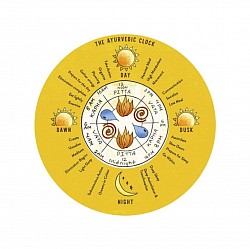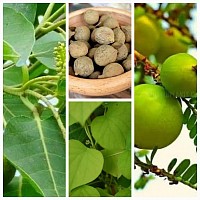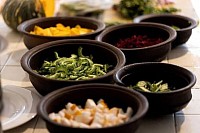🧘♀️ What Is Ayurveda?
"science of life"
Ayurveda means "science of life" in Sanskrit. It is based on the belief that health comes from a balance between the five elements (earth, water, fire, air, and space) and the three doshas:
Vata (Air + Space) – controls movement, nerves, and flexibility.
Pitta (Fire + Water) – controls digestion, energy, and body temperature.
Kapha (Earth + Water) – controls strength, stability, and immunity.
When these doshas are in balance, you feel healthy. When they are out of balance, illness appears.
🌿 Unique Features of Sri Lankan Ayurveda
Sri Lankan Ayurveda stands out due to its holistic approach, emphasizing the interconnectedness of mind, body, and spirit, and its focus on personalized treatments tailored to individual needs and imbalances. It also uniquely integrates with the local culture, incorporating practices like yoga, meditation, and a diet aligned with Ayurvedic principles within a serene, natural environment.
Here's a more detailed look at the uniquefeatures:
1. Holistic and Personalized Approach:
• Treating the Whole Person:
Sri Lankan Ayurveda addresses health by considering the individual's physical, mental, and spiritual well-being as a whole, rather than just focusing on the symptoms of a disease.
• Personalized Treatments:
Therapies are customized based on an individual's unique "dosha" (mind-body type) and specific health conditions, ensuring effective and targeted healing.
• Emphasis on Prevention:
Ayurveda in Sri Lanka emphasizes preventative care and maintaining balance to prevent illness before it develops.
2. Cultural Integration:
• Nature Connection:
Sri Lankan Ayurveda emphasizes a lifestyle in harmony with nature, using locally sourced herbs, natural therapies, and seasonal diets that promote a deep connection with the environment.
• Yoga and Meditation:
Yoga and meditation are integral parts of Ayurvedic treatments in Sri Lanka, used to balance the mind and body and enhance overall well-being.
• Integration with Local Culture:
Ayurvedic practices are often integrated with Sri Lankan culture, including traditional music and art, which contribute to the healing process.
3. Specific Ayurvedic Practices:
• Panchakarma:
This detoxification treatment aims to remove toxins from the body and restore balance to the doshas.
• Shirodhara:
A unique therapy involving the gentle pouring of warm herbal oils over the forehead to relieve stress and balance the body.
• Herbal Remedies:
Sri Lankan Ayurveda utilizes a wide range of local herbs, roots, and spices in its treatments, often incorporating traditional knowledge passed down through generations.
4. Modern Adaptations:
• Integration with Modern Medicine:
Sri Lankan Ayurveda is increasingly integrating with modern medicine to offer a more comprehensive approach to healthcare.
• Personalized Wellness Plans:
Ayurvedic practitioners offer personalized wellness plans that combine traditional wisdom with modern diagnostic techniques to help individuals achieve their health goals.
In essence, Sri Lankan Ayurveda offers a unique blend of ancient wisdom, personalized care, and cultural integration, making it a truly holistic and transformative approach to wellness.
🌱 Commonly Used Herbs:
Aralu (Myrobalan) – digestion and detox.
Bulu (Belleric) – respiratory health.
Nelli (Indian Gooseberry) – strong immunity booster.
Polpala (Aerva lanata) – for kidney and urinary issues.
Venivel (Coscinium fenestratum) – natural antibiotic, used for fevers.
🛀 Popular Ayurvedic Treatments in Sri Lanka
1. Panchakarma – 5-step detox and rejuvenation therapy.
2. Herbal Oil Massage (Abhyanga) – warms the body, relieves stress and joint pain.
3. Shirodhara – warm oil poured on the forehead to calm the nervous system.
4. Herbal Steam Baths – opens pores, removes toxins.
5. Kizhi Therapy – herbal bundles used for pain and inflammation.
🍛 Ayurveda and Food
In Sri Lankan Ayurveda, food is medicine. You eat according to your dosha and the season. For example:
Vata types need warm, moist foods like kenda (herbal porridge).
Pitta types benefit from cooling foods like gotukola sambol.
Kapha types should eat light, spicy foods like rasam or herbal teas.





